Key takeaways:
- Reparations politics involves recognizing historical injustices and their ongoing impacts on marginalized communities.
- Accountability in politics fosters trust and drives systemic change, especially in the context of reparations.
- Setting specific, measurable goals and seeking feedback from peers are effective methods for personal accountability.
- Sharing accountability with others creates a supportive community that enhances motivation and collective improvement.

Understanding reparations politics
Reparations politics is a complex and often contentious subject that dives deep into historical injustices and their ongoing impacts. I remember attending a community forum where someone asked, “What does justice look like for people whose ancestors built this country without compensation?” That question stayed with me because it encapsulates the struggle for acknowledgment and restitution that many advocate for today.
Understanding this issue requires a deep dive into history. I vividly recall discussing with a friend how the legacy of slavery and systemic discrimination continues to affect generations. It’s hard to ignore the disparities in wealth, education, and health that are rooted in these unjust practices. How can we possibly chart a path forward without recognizing these historical injustices?
Moreover, engaging with reparations politics often stirs up emotional reactions, asking us to confront uncomfortable truths. I sometimes wonder how much easier it might be to ignore these discussions if we weren’t personally touched by them. Yet, grappling with the realities can be transformative, pushing us to reconsider our roles in creating a more equitable society.
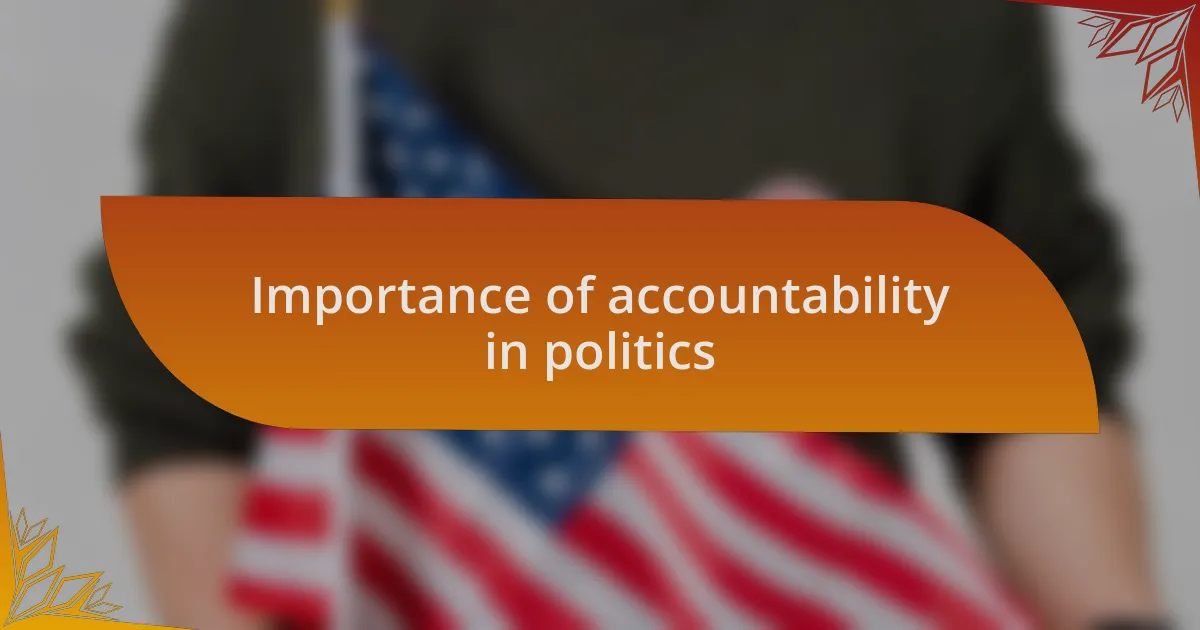
Importance of accountability in politics
Accountability in politics is crucial because it fosters trust between leaders and the communities they serve. I remember participating in a local government meeting where a council member openly addressed a past mistake in budget allocations. This transparency not only strengthened my faith in their leadership but also inspired other members of the community to hold their representatives to higher standards. When politicians are accountable, it signals that they respect the electorate’s right to know and participate in the decision-making process.
When accountability is emphasized, it helps to keep policies aligned with the needs of marginalized communities, particularly in discussions around reparations. I’ve seen firsthand how community leaders who own their missteps can rally support for necessary reforms. It makes me wonder—how can we expect meaningful change if the individuals making decisions about compensation and restitution are not held responsible for their actions and outcomes?
Moreover, accountability challenges the status quo and drives systemic change. I once attended a workshop where participants passionately debated the effectiveness of reparations proposals. The strongest arguments came from those who insisted that accountability ensures these proposals aren’t just words on paper. If we don’t demand accountability in reparations politics, are we simply perpetuating the cycle of injustice?
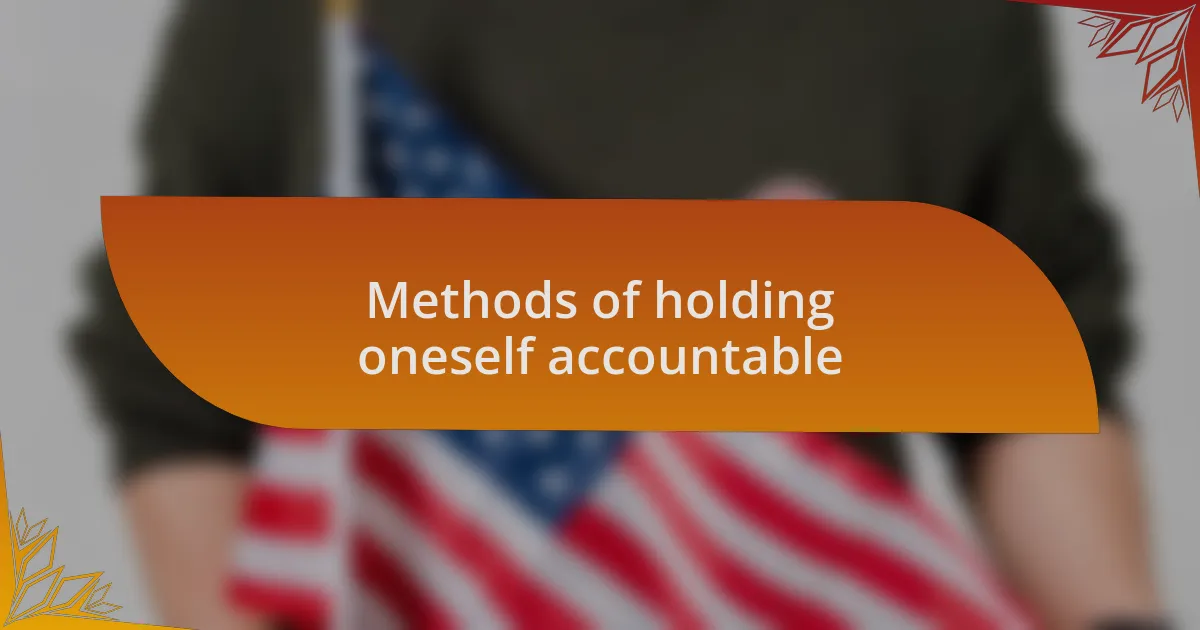
Methods of holding oneself accountable
One effective method I use to hold myself accountable is to set specific, measurable goals. I find that jotting down my objectives not only clarifies my intentions but also makes it harder for me to sidestep them. It’s like putting my promises in writing; those words carry weight, and I often ask myself, “If I don’t follow through, who will keep me in check?”
Another approach I find valuable is seeking feedback from trusted peers. By sharing my goals with a small group who understand my intentions, I create a support system where we hold each other accountable. For instance, during a discussion once, a friend reminded me of a commitment I made to amplify marginalized voices. That gentle nudge motivated me to take action instead of just talking about it, and it made me reflect—how often do we lean on our communities to help us stay true to our paths?
Staying reflective is also key to my accountability. I regularly take time to assess my progress and challenges, which helps me identify where I might be falling short. Journaling about my insights can be a powerful practice. I remember a moment of realization when I noted a recurring pattern of avoidance. It hit me: my accountability isn’t just about results; it’s about owning my journey, both the wins and the setbacks. Have you ever considered how much self-reflection could enhance your accountability, too?
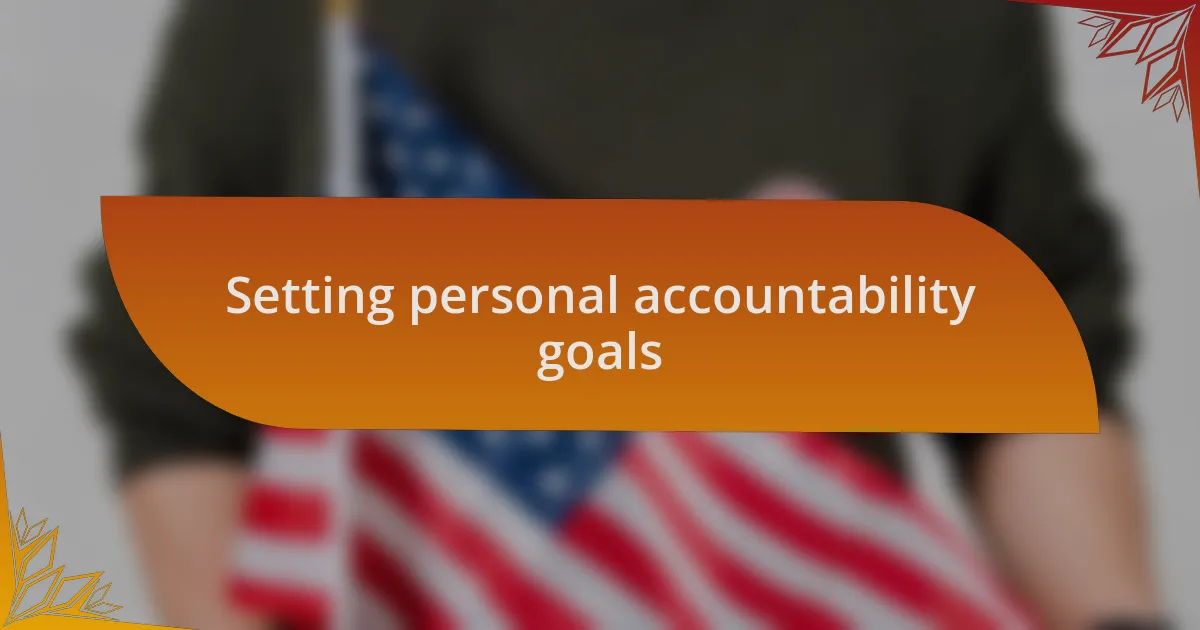
Setting personal accountability goals
Setting personal accountability goals is about defining what success looks like for me. I like to break down my larger aspirations into smaller, actionable steps. For instance, if my goal is to deepen my understanding of reparations politics, I might set a target to read one book a month on the subject. This not only makes it manageable, but it allows me to check off those smaller achievements, reinforcing the progress I’ve made.
I also emphasize the importance of aligning my goals with my values. When I committed to participating in community discussions on reparations, I felt a surge of purpose. It inspired me to create an action plan that included attending at least one event each month. Have you ever noticed how your values can ignite your drive? This connection makes me more passionate about my commitments, reminding me that accountability isn’t just a task but a reflection of who I am.
Finally, I believe in setting a timeline for my goals. Deadlines create a sense of urgency that can propel me into action. Recently, I set a goal to initiate a dialogue within my network about reparations. I gave myself a month to reach out and schedule those conversations, which motivated me to prioritize the initiative. There’s something powerful about knowing I have a time frame—it’s like a gentle push that keeps me focused. What time-bound goals have you set to boost your accountability?
![]()
Tracking progress in accountability
Tracking my progress in accountability has become a vital part of my journey. I create a simple spreadsheet where I jot down my goals, deadlines, and the actions I’ve taken. Recently, I realized that visualizing my advancement through colorful charts not only motivates me but also provides tangible proof of where I stand. Have you ever experienced that rush of excitement when you visually connect the dots of your efforts?
In addition to charts, I make it a habit to reflect weekly. During these moments, I assess both my achievements and setbacks. One week, I missed attending an essential community meeting, and while I felt disappointed, I used that as fuel for a discussion with a friend about the barriers I faced. This reflection not only revealed my struggles but also prompted productive conversations about accountability in our lives. How do you navigate through your setbacks—do they discourage you, or do they inspire you to rethink your approach?
Moreover, I find sharing my progress with trusted peers significantly enhances my accountability. By having regular check-ins, whether casual coffee chats or structured discussions, I create a support system that encourages me to stay on track. Just last month, I shared my book list with a close friend, and this ignited vibrant conversations that deepened my understanding. Isn’t it amazing how collectively sharing our journeys can amplify our commitment?
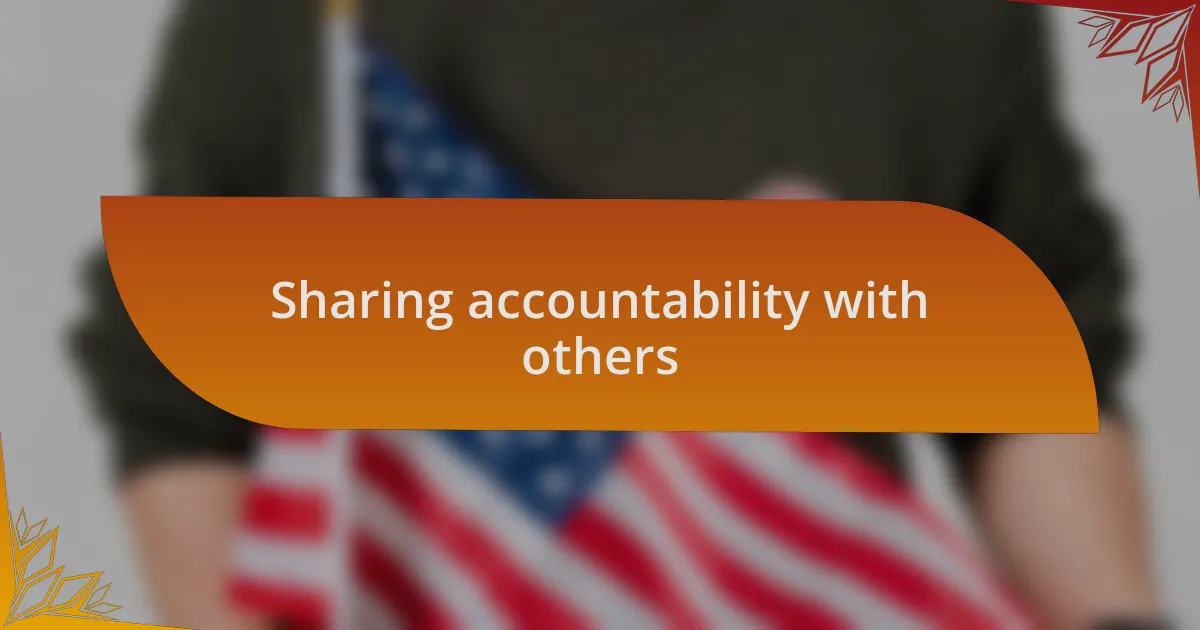
Sharing accountability with others
There’s something powerful about sharing my accountability journey with others. I remember when I joined a local group focused on reparations politics; we formed small accountability pods. Each week, we’d meet to discuss our goals and the challenges we faced. That camaraderie not only kept me motivated but also created a sense of community that I didn’t expect. Have you ever noticed how sharing your struggles can lessen their weight?
In another instance, I started a group text with a few friends who are also passionate about social justice. We decided to share our weekly wins and any obstacles we encountered. I was surprised at how our candid exchanges turned into brainstorming sessions, allowing us to explore new perspectives and solutions together. It felt like a collective empowerment; have you felt that rush when you realize you’re not alone in your struggles?
The beauty of sharing this responsibility is how it fosters stronger relationships. For instance, I recently collaborated with a colleague on a community initiative. By holding each other accountable, we not only pushed ourselves but also transformed our initial hesitations into creative strategies. We laughed off our missteps and celebrated each small victory, reminding each other that accountability doesn’t have to feel like pressure. Isn’t it enriching to have others walking alongside you in your journey?
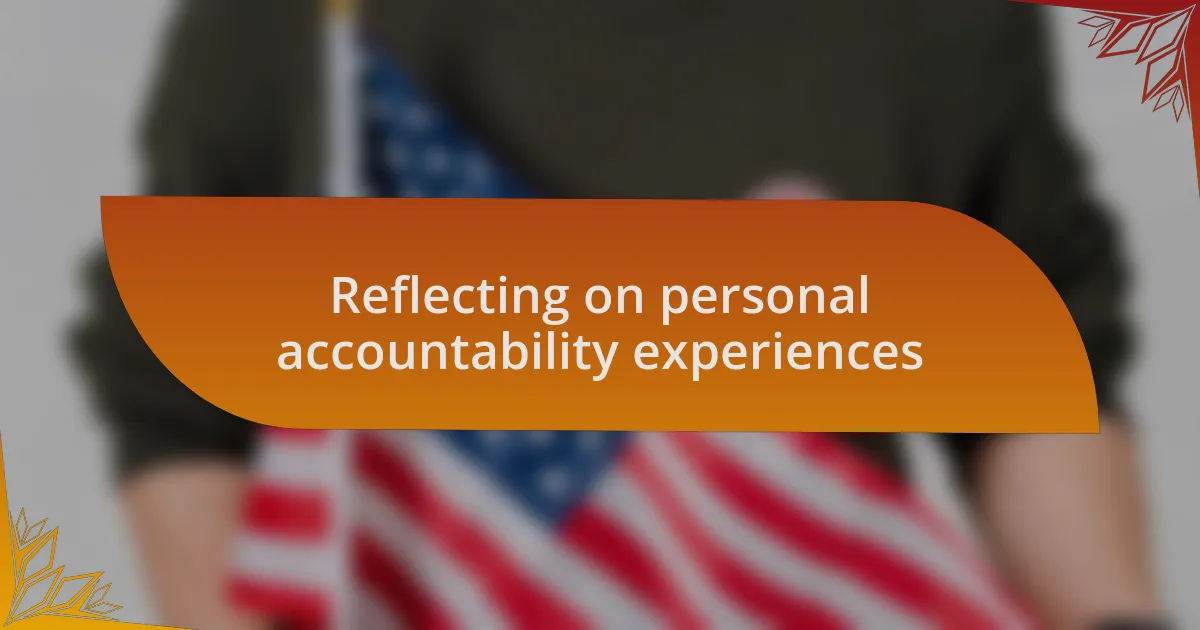
Reflecting on personal accountability experiences
Reflecting on my personal accountability experiences has often opened my eyes to my growth and setbacks. There was a time when I set a goal to actively educate myself about reparations policies. The initial excitement quickly turned into frustration as I struggled to grasp complex theories. I remember sitting with a stack of books, feeling overwhelmed—have you ever faced a challenge that made you question your commitment?
One particular moment stands out vividly. I had promised myself to engage in local discussions about reparations but found myself making excuses. It wasn’t until a friend called me out, gently urging me to take action, that I realized the importance of following through. That conversation sparked a fire in me, and I shifted from passive learning to active participation. How often do we allow fear of inadequacy to hold us back from doing what we truly care about?
Each time I reflected on these experiences, I recognized a pattern: the more accountable I became, the more empowered I felt. There was a noteworthy instance where I volunteered to facilitate a community workshop on reparations. Preparing for that session pushed me to learn deeply and confront my own biases. The anxiety I felt before the workshop turned into exhilaration when the participants engaged passionately. Have you experienced that shift when you realize you’re making a tangible difference? It’s these moments of connection that reaffirm my commitment to accountability in both my personal and community endeavors.